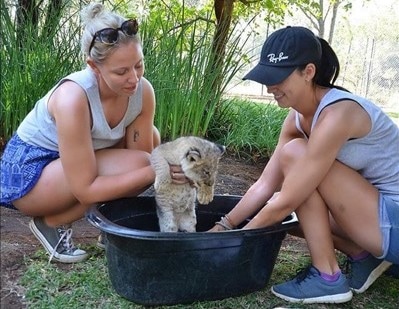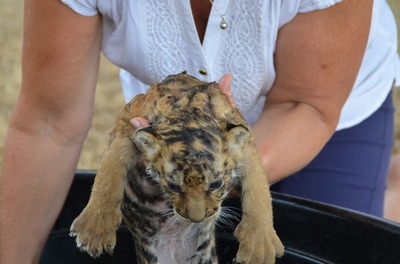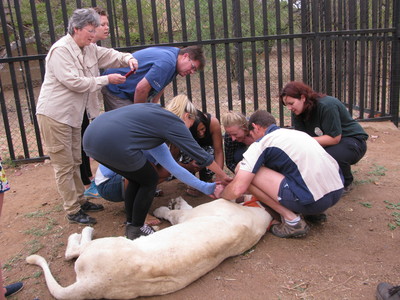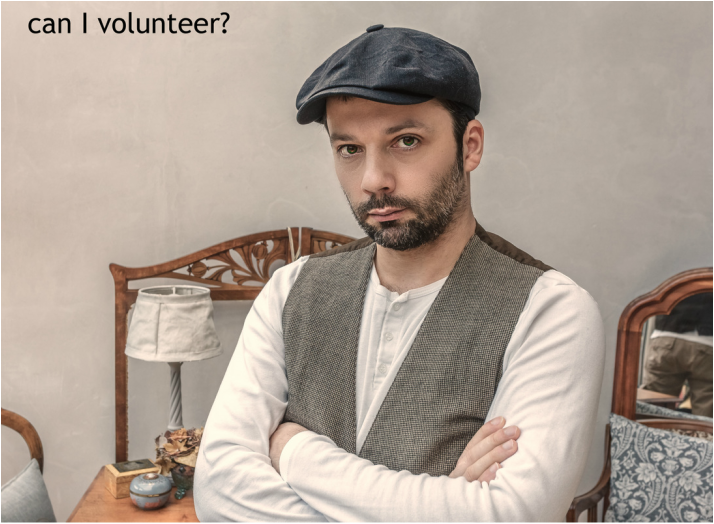ethical volunteering
This is my world, this is your world. What kind of world do you want it to be?
"volunteering is not a choice, it is a responsibility" unknown
Your volunteer help is essential in reaching our conservation objectives
At Ukutula the conservation philosophy has been centred around the contributions of many international animal loving volunteers for more than a decade. The conservation of almost a hundred animals is an immense task. It takes many hands to accomplish the daily routines.
The noble accomplishments have required a sacrifice of resources and time. Many of the volunteers have returned multiple times.
a word of caution for volunteers
At the end of September, 2016 a useful article entitled "Voluntourism: Are you really making a difference?" was published on the web. Written by Lisa Witepski, the article highlighted the importance of making sure that you are participating in a program that is helping, rather than hurting the conservation of the species. This is particularly important after the recent production Blood Lions revealed that unscrupulous volunteer recruitment breeding operators were conducting activities that had very little to do with conservation. We address this issue further under our "faq" section.
Much has been said recently, decrying the interaction of volunteers with animals as well. Interestingly, in the article, David Youldon, director of the African Lion and Environment Research Trust (Alert) says that there are many times when interaction is not only unavoidable, but necessary. He recognizes too that there are entirely valid reasons to ensure that animal interactions are in the best interests of the animals. As a volunteer at Ukutula, your "volunteerism" and animal interaction is backed by the "entirely valid reason" of documented science, unlike any other program in Africa. You also have the added assurance of a research program that ensures that none of the animals you will take care of is bred for the bullet - ethical volunteering as it should be!
Other pivotal aspects differentiating Ukutula from any other volunteer programs in Africa is the creation of the only privately owned research cryo-biology laboratory on the continent (self-funded with no outside help), thousands of school-children every year that are educated in preserving and not destroying these precious animals, as well as ongoing university veterinary and other education programs, all created to preserve threatened species from extinction. Ukutula also treasures the animals with which they are entrusted - no animal is ever delivered to killers of the animals, whether for hunting or body parts. On the other hand, you should also know that, in their efforts to totally eradicate any efforts to protect endangered species not in alignment with their own vision, activists such as the producers of Blood Lions (the documentary), have made destructive and false claims based on lies. You as a potential volunteer have the precious privilege of choice based on fact and evidence, supported by scientific research. The discerning volunteer is weary of a social media that attempts to sway minds away from a unique captive animal breeding program such as Ukutula. Instead they focus only on emotional trivial inaccuracies as well as generalities, but avoid any reference to the powerful positive results.
Much has been said recently, decrying the interaction of volunteers with animals as well. Interestingly, in the article, David Youldon, director of the African Lion and Environment Research Trust (Alert) says that there are many times when interaction is not only unavoidable, but necessary. He recognizes too that there are entirely valid reasons to ensure that animal interactions are in the best interests of the animals. As a volunteer at Ukutula, your "volunteerism" and animal interaction is backed by the "entirely valid reason" of documented science, unlike any other program in Africa. You also have the added assurance of a research program that ensures that none of the animals you will take care of is bred for the bullet - ethical volunteering as it should be!
Other pivotal aspects differentiating Ukutula from any other volunteer programs in Africa is the creation of the only privately owned research cryo-biology laboratory on the continent (self-funded with no outside help), thousands of school-children every year that are educated in preserving and not destroying these precious animals, as well as ongoing university veterinary and other education programs, all created to preserve threatened species from extinction. Ukutula also treasures the animals with which they are entrusted - no animal is ever delivered to killers of the animals, whether for hunting or body parts. On the other hand, you should also know that, in their efforts to totally eradicate any efforts to protect endangered species not in alignment with their own vision, activists such as the producers of Blood Lions (the documentary), have made destructive and false claims based on lies. You as a potential volunteer have the precious privilege of choice based on fact and evidence, supported by scientific research. The discerning volunteer is weary of a social media that attempts to sway minds away from a unique captive animal breeding program such as Ukutula. Instead they focus only on emotional trivial inaccuracies as well as generalities, but avoid any reference to the powerful positive results.
Ukutula BioBank and Conservation Center is the only authentic ethical volunteer opportunity established on the basis of scientific research with zero tolerance for canned hunting or the body parts trade
Volunteers contribute to the health and safety of the animals in pursuit of ongoing research.
volunteering expressions
...volunteerism benefits both society at large and the individual volunteer by strengthening trust, solidarity and reciprocity among citizens, and by purposefully creating opportunities for participation."2011 United Nations State of the World’s Volunteerism Report "Volunteering overseas can help you to share and learn skills. And it can feed an interest in discovering new places and cultures" Volunteer Canada I volunteer because I can. It’s as simple as that. If you could do something to help the world around you, why wouldn’t you? K.G I volunteer because I always want to learn something new" Jane S. I volunteer because I want to not just see the world, but make a difference in it" Abbie M |
Volunteering can be an exciting, growing, enjoyable experience. It is truly gratifying to serve a cause, practice one's ideals, work with people, solve problems, see benefits, and know one had a hand in them." Harriet Naylor (pioneer in the development of volunteer program management - USA) I volunteer because I need to feel I can take meaningful action" J.S I volunteer to learn something new or to acquire a skill that I lacked. I couldn’t go out and get a job to learn that skill, but I could volunteer and learn it" Pam M. Volunteering is an excellent way to get under the skin of a country and come to grips with a different culture" M.L I've worked with extremely enthusiastic scientists and have always felt part of the team. Volunteers are not just given the donkey work. It is really rewarding and I have learnt so much. I have no zoological training but have had the chance to do many technical things relating to the research |
good question - who can volunteer?
Anybody that has a "sponge-like" quality, is in reasonable health and is between the age of 18 and 70. It is vital that you have a good understanding of English - all your instructions will be delivered in English.
Our volunteers come from all walks of life - some are business people and professionals, bankers, accountants, teachers, lawyers, etc. who have used their holidays to volunteer. Generally, these volunteers manage to contribute their time and energy for an average of two weeks.
Our volunteers come from all walks of life - some are business people and professionals, bankers, accountants, teachers, lawyers, etc. who have used their holidays to volunteer. Generally, these volunteers manage to contribute their time and energy for an average of two weeks.
how can i better equip myself?
It is wise to consider what courses you could do independently to equip yourself for your placement. Certainly practical would be a first-aid and travel-safety course.
In North America, the following are a few suggestions for places offering courses:
American Heart Association
www.americanheart.org
American Red Cross
www.redcross.org
Canadian Red Cross
www.redcross.ca
Wilderness Medical Associates
www.wildmed.com
Let us know if you have knowledge of where these courses are available in Mexico, South America, Australia, New Zealand and Asian countries! We would love to share the knowledge!
In North America, the following are a few suggestions for places offering courses:
American Heart Association
www.americanheart.org
American Red Cross
www.redcross.org
Canadian Red Cross
www.redcross.ca
Wilderness Medical Associates
www.wildmed.com
Let us know if you have knowledge of where these courses are available in Mexico, South America, Australia, New Zealand and Asian countries! We would love to share the knowledge!
volunteer facts
Over 13.3 million people—accounting for 47% of Canadians aged 15 and over—did volunteer work in 2010
The annual Volunteering and Civic Life in America research report released in December 2015 shows that service to others continues to be a priority for millions of Americans. The Federal study highlighted the fact that 1 in 4 Americans volunteered through an organization in 2015
Americans aged 35-44 had the highest volunteer rate (29.8 percent) followed by those aged 45-54 (28.5 percent)
Nearly 80 percent of volunteers donated to charity, compared to 40 percent of non-volunteers. Overall, half of all citizens (50.5 percent) donated at least $25 to charity in 2014
Volunteers have 27 percent higher odds of finding a job after being out of work than non-volunteers, possibly due to developing new skills and expanding personal networks
28.8% of women volunteer
22.5% of men volunteer
The annual Volunteering and Civic Life in America research report released in December 2015 shows that service to others continues to be a priority for millions of Americans. The Federal study highlighted the fact that 1 in 4 Americans volunteered through an organization in 2015
Americans aged 35-44 had the highest volunteer rate (29.8 percent) followed by those aged 45-54 (28.5 percent)
Nearly 80 percent of volunteers donated to charity, compared to 40 percent of non-volunteers. Overall, half of all citizens (50.5 percent) donated at least $25 to charity in 2014
Volunteers have 27 percent higher odds of finding a job after being out of work than non-volunteers, possibly due to developing new skills and expanding personal networks
28.8% of women volunteer
22.5% of men volunteer
man is so made that he can only find relaxation from one kind of labour by taking up another - Anatole France
a project like no other
daily activities at ukutula
This research project is very hands-on, and volunteers will be expected to help with the day-to-day care of all the animals (though nobody is under obligation to do anything they would prefer not to). Care extends to the lions, cheetahs, tigers, caracals, servals, black-footed cat, spotted hyenas, giraffe, ostrich, including all the antelope.
Daily volunteer duties include:
Daily volunteer duties include:
- Caring for lion, cheetah cubs and hyena pups - this includes stimulating, bathing, feeding (making bottles and feeding every 3 hours) and assisting with guest interaction
- Cleaning enclosures of old carcasses and waste, maintenance, replacing water in ponds
- Cutting up meat and feeding adult lions, cheetahs, caracals, servals, black-footed cat, tigers and hyena
- Assisting with educational activities
- Monitoring of sick or injured lions and cubs
- Participation in the daily running of the farm and kitchen duties
- Repair and installation of fencing in enclosures and perimeter of reserve
- Removal of poachers traps
- Collecting and placement of vegetables as well as feed in bush for free roaming antelope, zebras, giraffe and ostrich
- Tree pruning for game viewing access
- Fire fighting in rare instances of bush fire
- Helping to pull guest vehicles out of the mud (a new assignment resultant from global climate change!)
appreciated by others
Best experience ever. Would recommend the walk with lions as it is simply awe inspiring. |
Spent the day there and we did two walks out. We got to play with the cubs and see the other cats they look after. The lodge was fully booked but I do so wish I stayed there. Much respect for the students from around the world volunteering and doing research" F.D |
2023 International volunteer day
International Volunteer Day (IVD) is celebrated every year on 5 December and was designated by the United Nations in 1985 as an international observance day to celebrate the power and potential of volunteerism for the purpose of making the world a better place. What better way in contributing effort toward the preservation of endangered species?
Why not celebrate this day (and more) at Ukutula Conservation Center?
Why not celebrate this day (and more) at Ukutula Conservation Center?
benefits from volunteering
- improved leadership skills
- communication skills enhanced
- listening skills developed
- understanding skills refined
- adding "Overseas work experience" to your resumé
- increased understanding of development issues
- experience in consolidating practical skills
- hands-on experience that comes from working in the field
- learned adaptability
- self-confidence
- self-motivation
- help in refining career focus
- appreciation for the quality of dedication
- cultivation of relationships - mixing with people from across the globe widens perspectives and culture
Don't ever question the value of volunteers. Noah's Ark was built by volunteers; the Titanic was built by professionals" Unkown
a scientific research project has standards
All volunteers are reminded on arrival that the Center is not a party venue, but a place for scientific study and conservation. For this reason there are specific standards as follows:
All volunteers are reminded on arrival that the Center is not a party venue, but a place for scientific study and conservation. For this reason there are specific standards as follows:
- All volunteers are to communicate and work as a team to ensure a pleasant working environment and experience whilst on the project.
- It is requested that all behaviour at the bar be orderly. The seriousness of this request is evident from the fact that anybody who is drunk and misbehaves could even be asked to leave the project.
- It is requested that every volunteer be respectful and sensitive with regard to sexual matters, whether this relates to speech, suggestive clothing, flirting etc. Harassment of any kind is cannot be tolerated.
- It is also requested that there be no attempt to establish relationships with any staff or guests at Ukutula.
- An established rule specifies that no volunteer will frequent the staff accommodations and the same applies that no staff member will frequent the accommodations of a volunteer.
- Volunteers are Ukutula representatives for the duration of their stay and, as such, professional conduct is expected of them.
- No alcohol or smoking is allowed in the chalets.
- Use of, or distribution of any form of narcotic is forbidden at Ukutula.
gaining credentials while volunteering at ukutula
Consistent with the value of education at Ukutula, volunteers now also have the option of obtaining the accredited Predators Course offered by the Wildlife Education Foundation and presented on-site at Ukutula Conservation Center. A special price of ZAR 500.00 has been negotiated for Ukutula volunteers. Upon successful completion of the course, each student will receive an official WEF (Wildlife Education Foundation) certificate.
For more details, click on the button below:
For more details, click on the button below:



